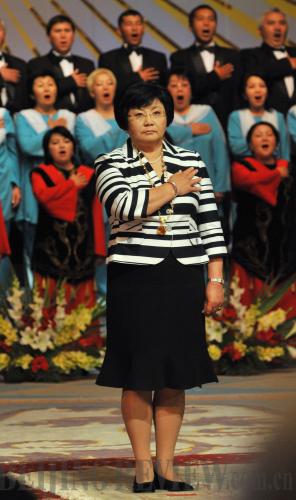|
 |
|
TAKING THE OATH: Roza Otunbayeva, is sworn in as president for a transitional period until December 31, 2011, in Bishkek on July 3 (XINHUA/AFP) |
The second challenge for Otunbayeva is the poor economy. Kyrgyzstan is located in the hinterland of Central Asia. Scarce in resources and weak in economic foundation, it is one of the poorest countries in the Commonwealth of Independent States.
The poor economy and low living standards are the basic reasons for the multiple riots and change of governments. Since Bakiyev took power following the Tulip Revolution in 2005, the Kyrgyz economy has seen no improvement. Kyrgyzstan's per- capita GDP was only $870, about one 10th that of Kazakhstan. And people's income increased quite slowly.
Things were even worse after the global financial crisis broke out in 2008. In 2009, its GDP dropped to about $4.6 billion, its currency depreciated by 30 percent, and the income of locals going abroad to work plummeted by 60 percent. Falling incomes, coupled with inflation, made people's lives miserable.
In 2010, the government's budget deficit hit $300 million. Since the beginning of this year, electricity prices have doubled and heating costs have risen by five to 10 times. These resulted in many complaints from the Kyrgyz people.
After the interim government was set in place, it lowered water and electricity prices, increased policemen's salaries and paid the salaries of civil servants on time. Through these measures, it won the support of a section of the people.
But ethnic riots in the south worsened the economic situation. The riots caused the departure of a large number of foreign businessmen as well as the flight of foreign investment and suspension of many cooperative projects. It will be hard for the Kyrgyz Government to overcome economic difficulties in the short term.
The third challenge is in maintaining stability. North-south conflicts and ethnic grievances form potential causes of Kyrgyzstan's social unrest.
Former President Bakiyev was a representative of southern forces. When he was in office, northern forces were completely marginalized. This aroused complaints in the north for a long time. In the 2009 presidential election, Bakiyev generally obtained less than 50 percent of the vote in northern regions.
In March, the political opposition instigated a large-scale riot, which spread nationwide. By April 8, the interim government had gradually brought most of the regions to order. The state's security apparatus started to work again and social order was restored. Bakiyev fled abroad.
But, from June 10-14, a massive ethnic riot broke out in the south of Kyrgyzstan, in which nearly 270 people were killed. Hundreds of thousands of refugees fled to Uzbekistan. The situation was almost out of control.
In a word, the time bomb of deeply rooted regional and ethnic conflicts in Kyrgyzstan went off.
Kyrgyzstan's military and police forces have long been weak. Poorly equipped and with low training levels, they are not capable enough of maintaining social stability.
Although the situation in the south is easing, Otunbayeva on June 27 extended the state of emergency in the south to August 10.
Intervention of external forces may make Kyrgyzstan's social unrest worse. During the riots, a large number of weapons fell into the hands of terrorists. In addition to the rampant activities of terrorism, separatism and extremism in the south, grassroots political power is weak, so it is difficult for the government to effectively control the region—especially the Fergana Valley, where Kyrgyzstan, Uzbekistan and Tajikistan border on each other. It is the weakest point of Central Asian security. And it holds great potential to threaten Kyrgyzstan's future social stability.
Another challenge for Otunbayeva is in the rebuilding of infrastructure and restoring of production. It is a pressing task for the Kyrgyz Government to restore production and improve people's livelihoods. But the destruction caused by the riots has increased the cost of reconstruction. In addition, the government is lacking funds, making the situation quite difficult for Otunbayeva.
How to ease ethnic conflicts is also a headache for Otunbayeva. While meeting local NGO representatives after attending the referendum, she said the government needed to rely on "citizen diplomats" to solve the Uzbek-Kyrgyz ethnic conflicts. She promised to solve the housing and schooling problems of the returned refugees before winter. But, given the state of the national treasury, keeping this promise will be a severe test.
External factors
The new government is also faced with grave challenges in international relations. It still has to find a balance between the United States and Russia.
Kyrgyzstan is an area of interest for various international forces, especially the United States and Russia. Russia has traditional interests in Kyrgyzstan and the United States regards Kyrgyzstan as an important transit center for its war in Afghanistan since the country offered it an air base at the Manas Airport near Bishkek.
Both the United States and Russia want to expand their influence in Kyrgyzstan. Currently, U.S.-Russian relations are improving and the two countries have reached a good understanding in discussions of the Kyrgyz situation.
In late June, Russian President Dmitry Medvedev paid a visit to the United States. The two sides increased coordination on the Kyrgyz issue. Presidents Medvedev and Barack Obama also issued a joint declaration on the Kyrgyz situation.
But Central Asia is Russia's sphere of influence. Russia does not want external forces to intervene.
Although the United States played down the issue of the air base at Manas after the overthrow of former President Bakiyev and sent out signals of cooperation during Medvedev's visit, it will not easily concede on the air base issue.
Russia was not satisfied. Medvedev said, before the visit, the U.S. military base in Kyrgyzstan should not remain in the long term.
The author is a research fellow with the China Institutes of Contemporary International Relations | 